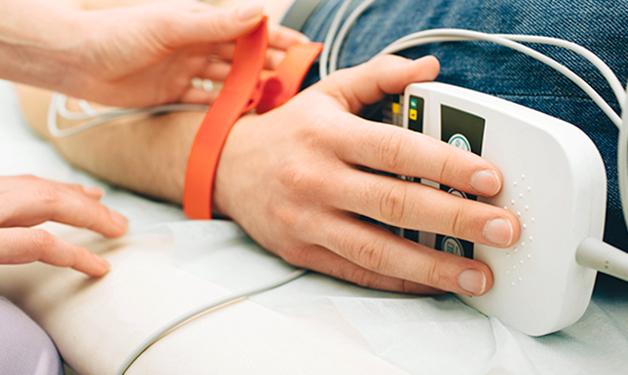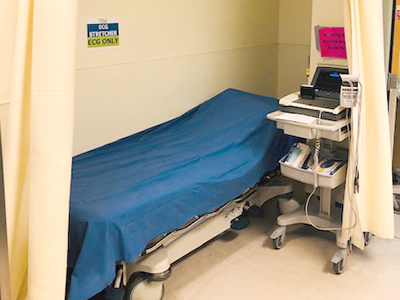
Researchers assessed a new protocol that dramatically cut down on wait times for a key procedure.
When a patient walks into an emergency room with chest pain, every minute counts. A protocol aimed at cutting down patient wait times for an essential heart condition diagnostic test was implemented at Vancouver General Hospital (VGH), and research conducted through Vancouver Coastal Health Research Institute (VCHRI) reveals how well the protocol has performed, along with areas that could benefit from additional attention.
“Our study not only quantified how much wait times were being reduced, it dug deeper into the numbers to identify areas for further investigation and clinical improvement,” says Neda Khoshnood Grant, who authored the study, Evaluation of a new emergency department triage process on door-to-ECG time.

VGH’s pre-registration ECG protocol was created after a 2014 assessment put the hospital at the top of the list of longest door-to-electrocardiogram (D2ECG) wait times in the region. Led by VGH’s Emergency Department Quality Council and established in 2016, the protocol put into place a pre-registration process, along with a designated electrocardiogram (ECG) space, to cut down on D2ECG wait times.
“Before an ECG was obtained, walk-in patients experiencing chest pain would previously be triaged and then registered,” says Khoshnood Grant, who worked as an emergency department nurse at VGH and Lion’s Gate Hospital before conducting this research.
"The pre-registration ECG process skips the middle step and moves directly from a patient presenting to the triage desk with chest pain to being taken to the designated ECG space.”
Khoshnood Grant and principal investigator Martha Mackay, a fellow VCHRI researcher, note in their research findings that the new system did not delay care delivered to patients with cardiac arrhythmia—another heart condition that likewise calls for an ECG to diagnose—and required no additional staffing or health care costs.
“We found that the success of VGH’s pre-registration ECG protocol had a lot to do with the education and awareness that was brought to the emergency department team by the Quality Council,” says Mackay. “It is a collaborative, cross-departmental effort that has seen dramatic results.”
A step in the right direction to reduce wait times for walk-in heart patients
Heart disease is the second leading cause of death among Canadians, and a leading cause of hospitalization, according to the Canadian government1. In 2012-13, around 2.4 million Canadians over age 20—or one in 12—were living with coronary heart disease2. These numbers are expected to grow with Canada’s aging population3.

An ECG, which creates a picture of the electricity conducted through the heart, is a pivotal diagnostic tool with which to determine the presence and type of acute coronary syndrome (ACS). ACS is any condition that reduces blood flow to arteries in the heart and can lead to heart tissue damage or destruction, e.g., a heart attack.
Patients with ACS should ideally be given an ECG within 10 minutes of arriving at the hospital in order to receive emergency treatment and prevent irreversible heart damage.

For their research, Khoshnood Grant and Mackay assessed statistical information on adults aged 30 and older who walked into VGH’s emergency department with chest pain and received an ECG. Half of the over 4,000 patient cases they examined took place within the nine-month period before the pre-registration ECG protocol was implemented, and half occurred in the nine months after the protocol launched.
“We found that the new triage process at VGH reduced door-to-ECG wait times from a median of 40 minutes to a median of 10 minutes.”

A myriad of factors likely contributed to the longer wait times for these two groups, say Khoshnood Grant and Mackay. Heart attacks are a leading cause of mortality among women, but some women present to hospital with symptoms that do not ring alarm bells about a possible heart attack, which can make a diagnosis more difficult, notes Mackay. Similarly, older adults may have comorbidities, atypical symptoms and physical limitations that can increase their D2ECG time.
In both cases, Khoshnood Grant and Mackay’s research calls for more research, education and potential procedural changes to address this discrepancy.
“There is likely room for more education to help triage nurses better identify symptoms of ACS among women and older adults,” says Mackay. “While we did not examine this specifically in our study, our results do point to it as an area that warrants further investigation.”
This study was completed in collaboration with Susan Dahinten, associate professor with the UBC School of Nursing, and Dr. Corinne Hohl, an associate professor in the Department of Emergency Medicine at UBC, a scientist at the Centre for Clinical Epidemiology and Evaluation and an attending physician at VGH’s ED. The study team wishes to extend gratitude to Dr. Heather Lindsay, Jamie Gallaher, Cassie Wright, Lori Korchinski, Dr. Chad Kim Sing and other physicians and nurses in the emergency department.
1 Government of Canada - Heart disease in Canada: Highlights from the Canadian Chronic Disease Surveillance System
2 Report from the Canadian Chronic Disease Surveillance System: Heart Disease in Canada, 2018


